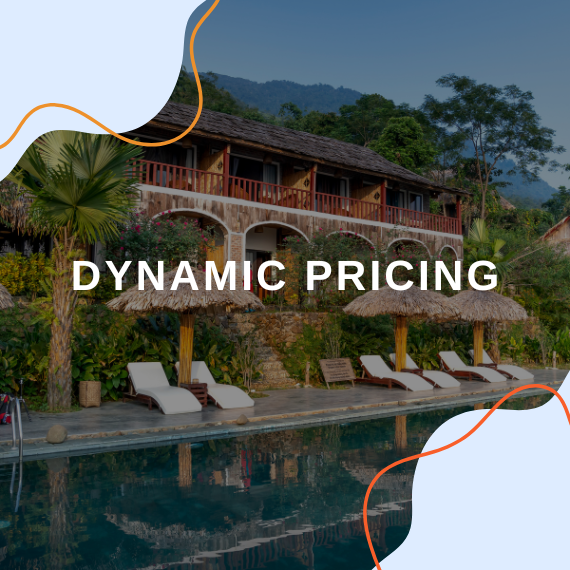Hotel Dynamic Pricing: What are the benefits and effective strategies to improve revenue?

Hotel Dynamic Pricing: What are the benefits and effective strategies to improve revenue?
Hotel Revenue managers and hoteliers encounter constantly fluctuating travel trends and it is challenging to keep up with swiftly changing demand and supply. There are several moving pieces that have to be adjusted with each change to optimize revenue and reap the most benefits when there is an increased demand. This is where Dynamic Pricing can help their room rates reflect real-time market conditions with the use of an algorithm, it adjusts prices to meet the demand and mirrors the market trends hence making it a lot simpler for revenue managers to optimize revenue during uncertain times.
What is Dynamic Pricing?
Hotel Room Pricing strategies can be broken down into two main categories: static pricing and dynamic pricing.
As the name suggests, Static Pricing involves a hotel keeping the same hotel room rate for a certain period, it does not change with the market demand-supply. On the contrary, Dynamic Pricing is the strategy that enables pricing to fluctuate reflecting the market trends and the vacancy available. Rates can change on an hourly basis based on real-time market data.
As a Hotel Manager, you want to be able to sell the right room at an optimal price to your guest, and the optimal price can mean a million things to different people. But here is what we think is the most important aspect. If the room is overpriced, you will miss out on revenue opportunities affecting your occupancy rate. And if the room is under-priced, you will be leaving your Average Daily Rate dollars, both of these conditions will affect your Revenue per Available Room (RevPAR).
With Dynamic Pricing, the hotel can tap into the power of automation to respond to the increasing and decreasing demand to adjust the prices that maximize their room revenue. As the demand goes up, the price will go up and as the demand decreases, the room price will decrease to maximize the bookings. Dynamic pricing also accounts for the availability as the check-in date approaches. For example, if you are close to selling out, the rates will automatically go up. However, if there are still a lot of vacancies, the price will be pushed down to drive more occupancy. Dynamic pricing isn’t unique to the hospitality industry, it is also very popular in other industries for instance; air travel, ride-sharing, and the entertainment industry.
What are the benefits of dynamic pricing in hotels?
Dynamic pricing is a popular Revenue Management Strategy that has been used by businesses for years. It has numerous benefits including revenue growth and customer satisfaction. In this article, we will highlight the top three benefits of dynamic pricing.
1. Boost Sales and Improve Revenue
One of the important goals of revenue management is to mitigate losses as a result of unsold rooms. Dynamic pricing helps understand market trends for pricing rooms that meet the market price. By implementing a dynamic pricing model, revenue managers can stay on top of the market demand and supply to improve their occupancy rate and boost their sales.
2. Make Data-Driven Decisions to Create Higher Demand
Dynamic pricing strategy can be used to attract new customers who are price-sensitive, particularly the ones with a high barrier to entry at respective price points. Using hotel management software that enables dynamic pricing, hotel managers can collect and study reservation data, seasonality changes, conversion data, cancellations, and no-shows to make demand forecasts to set pricing according to what the customers are willing to pay.
The hotel pricing strategy should match market trends to ensure that customers do not feel suspicious. However, a quick drop in the hotel room price can push the price-sensitive customer to decide to book and ultimately increase your occupancy rate.
3. Understanding Customer Behaviour and Preferences
Dynamic pricing algorithm allows you to monitor booking patterns, create and monitor multiple customer segments and help you understand how they impact your business. Different customer segments have different preferences when it comes to their hotel bookings, by placing all those pieces in their respective boxes, you can make your hotel more attractive to your guests. For instance, you can see how customers are impacted by special occasions and peak seasons, and can change your pricing to increase the stay length to maximize your revenue. In addition to increasing occupancy during peak season, you can attract other market segments that normally don’t book by incentivizing them temporarily.
What are the effective dynamic pricing strategies?
As a hotel or travel manager, it is essential to position your rates according to the market trends and your competitor's pricing. With an automated dynamic pricing system, it can get challenging to control rates which is why you might be intrigued to opt for static pricing. However, there are effective dynamic pricing strategies that can be implemented to achieve better results than the static pricing strategy.
1. Occupancy-based dynamic pricing
As your occupancy increases, the dynamic pricing model will push the price to go up. If the price increase is more than what your customer is willing to pay, you might lose potential bookings. In such cases, you can take a measured approach. For instance, if there is 20% occupancy, instead of increasing the room rate by 30% or 40%, you can increase the room price by 20% to mitigate the risk of overpricing and losing revenue. As time passes, you can further increase or decrease the rate to achieve a full house. This strategy can be more profitable than static pricing since it allows you to achieve a higher average rate.
2. Length of Stay-based dynamic pricing
As a hotelier, you must be faced with busy and slow nights. It is easier to get fully booked on busy nights but challenging to achieve full occupancy on slower days. With stay restrictions on busy nights, you can boost your pre and post-night bookings. You can implement a Minimum Length of Stay (MinLOF) to give preference to guests who are willing to book an extended stay over one night. Even if you offer a lower price, the added occupancy on slower nights will increase your overall revenue. As you get closer to the booking date, you can remove the restrictions to fill the remaining occupancy.
This strategy is a little tricky to implement because it can backfire if the demand is not high enough and you lose potential customers. We would suggest collecting enough historical data to back up your decision.
3. Competitors-based dynamic pricing
If you are not sure about how to set your pricing strategy with numerous variables to think about, simply focus on competitor prices and market trends. Your customers are looking for value for money and are constantly comparing your prices with your competitors and so should you. Getting booked before your competitor is not always the best scenario, it might mean that your rates were too low and you have left higher-priced bookings to your competitors.
Your competitor's pricing is a good indicator of the demand and how it will change on a day-to-day basis. It is vital to select your compset, which is a set of 4 to 5 competitors that cater to the same customer segments as you. If the rates of your competitors suddenly rise, it is a clear indication that they are expecting an increase in demand and you need to adjust your pricing accordingly.
How to implement dynamic pricing for your business?
Dynamic pricing has many benefits and if you are not already using Dynamic Yield Management Strategy, you might be wondering how to implement it effectively and where to start. You might want to look internally and see if your property management system offers a Dynamic Pricing Feature that you can utilize for Revenue Management. If not, you can search for an All-in-One Property Management System that automates and simplifies your hotel operations, increases your profitability – and elevates the guest experience. Zaui Stay offers a suite of tools from access control and booking management that enhance your operational efficiency to the channel manager and dynamic pricing that can help maximize your profits and your selling potential.
If you are new to the world of dynamic pricing, our team can help you find the best solution for your business. You can book a personalized demo, and our team will reach out and guide you every step of the way.
Related Posts

What to Look for in a Travel Booking Software in 2026
Discover the essential features to consider when selecting a travel booking software in 2026 to streamline your travel booking process and enhance customer experience.

Zaui’s New Booking Policy Toolkit: Flexible Cancellations, Smarter Revenue Protection
Should you add a booking fee? Discover how this strategy can impact your revenue and customer satisfaction in our expert analysis.

Passing Booking Fees: A Smart Revenue Strategy or Customer Turn-Off?
Should you add a booking fee? Discover how this strategy can impact your revenue and customer satisfaction in our expert analysis.


Frequently Asked Questions
No. Zaui’s pricing is fully pay-as-you-go. You aren’t locked into any long-term contract. In fact, leading platforms emphasize this flexibility. Similarly, Zaui lets you start and stop anytime. You can change or cancel your plan freely, so you only pay for what you use.
Absolutely not. Zaui’s pricing is 100% transparent. We disclose all fees up front with no surprise add-ons or “sneak-in” charges. In fact, Zaui’s plans include all core features “without additional fees”. Industry experts note that hidden fees undermine trust so we avoid them entirely. All costs are clearly outlined in our pricing, and there are no extra setup charges or undisclosed surcharges at checkout.
Zaui integrates with major payment gateways (e.g. Stripe) so you only pay standard credit-card processing rates (roughly 1.9%+$0.30/transaction) and we don’t mark them up. Only the published platform commission is added on bookings. You also have full control over who pays the commission, we let you decide whether to absorb booking fees or pass them on to customers. In short, you’ll only pay the transparent booking commission and normal gateway fees, nothing extra.
Your onboarding and support are included in the price. We provide white-glove setup help and ongoing 24/7 support at no additional cost. Our dedicated customer-success team will guide you through every step, ensuring a smooth launch. You won’t pay extra for training or service other than the onboarding fee; it's all built into your plan.
You can schedule a free demo with our team. Our Zaui ninjas will walk you through pe how Zaui can work for your business and highlight opportunities to grow with our advanced features all without any upfront payment. This way, you can feel confident it’s the right fit before making a commitment.
Of course. Zaui’s plans are fully flexible. You can upgrade or downgrade at any time to match your needs, without penalties. You can move to a higher tier or back down easily, and your billing adjusts automatically.
No. Zaui does not charge its commission on offline/manual bookings. “No fees on offline bookings” You only pay the commission when a booking is processed online through our system. Manual reservations (or bookings from partner channels we set up for you) incur no extra platform fee. (30% or less)
All of Zaui’s core features are included in your plan at no extra charge. We believe in value and transparency: Zaui provides over 15 advanced features (Google Things to do, reporting tools, marketing tools, reports, etc.) at no additional cost. Many competitors charge extra or require higher plans for the same features, but with Zaui you get the full suite of tools in one package. Any optional add-ons (if any) will always be clearly listed and optional there are no surprise paid upgrades for standard features.
Each Zaui plan is designed for clarity and fairness, following industry best practices. You can trust that our pricing is transparent and flexible, with the support you need built in.
Extra accounts- unlimited agents, resellers, user



